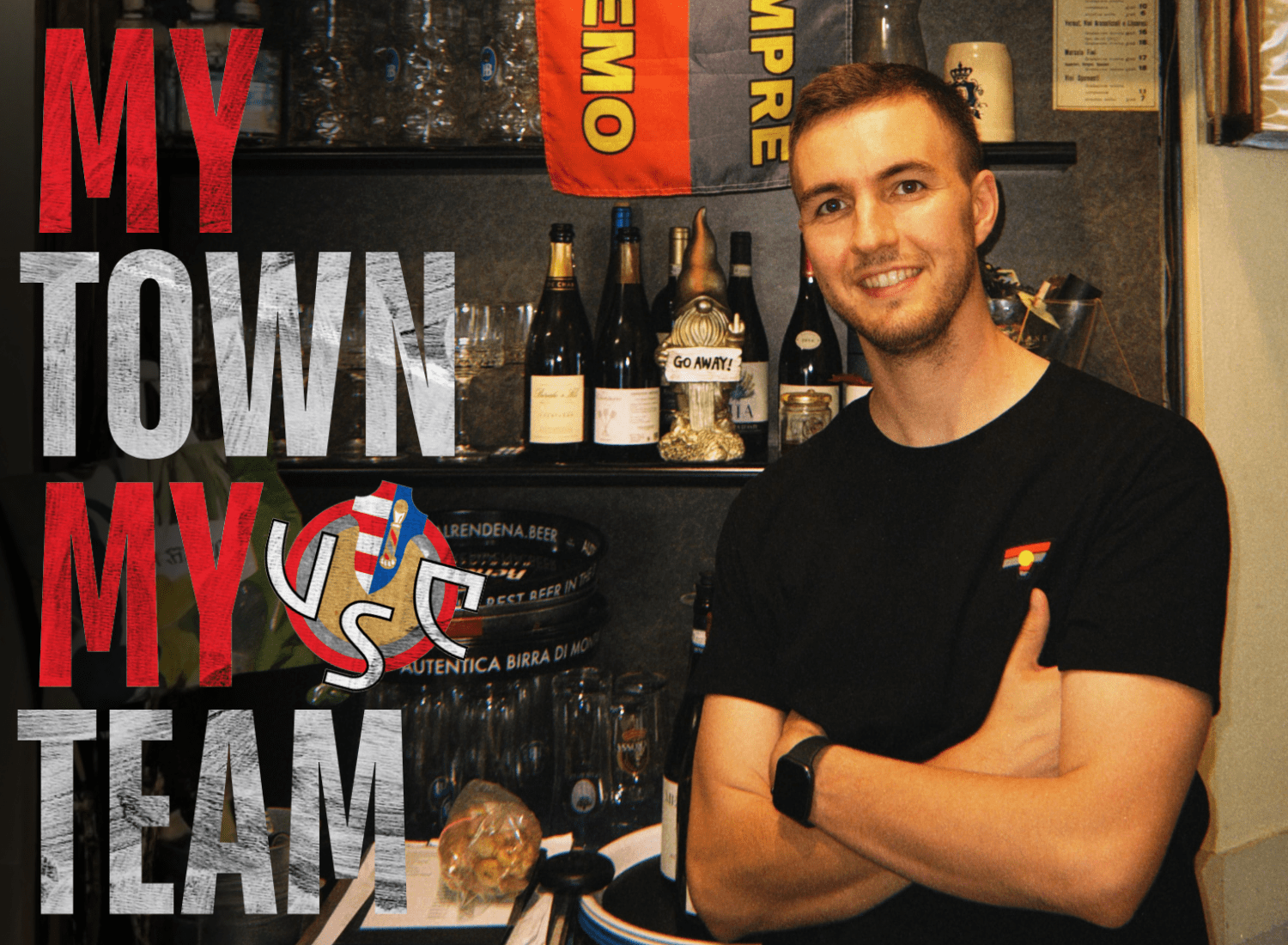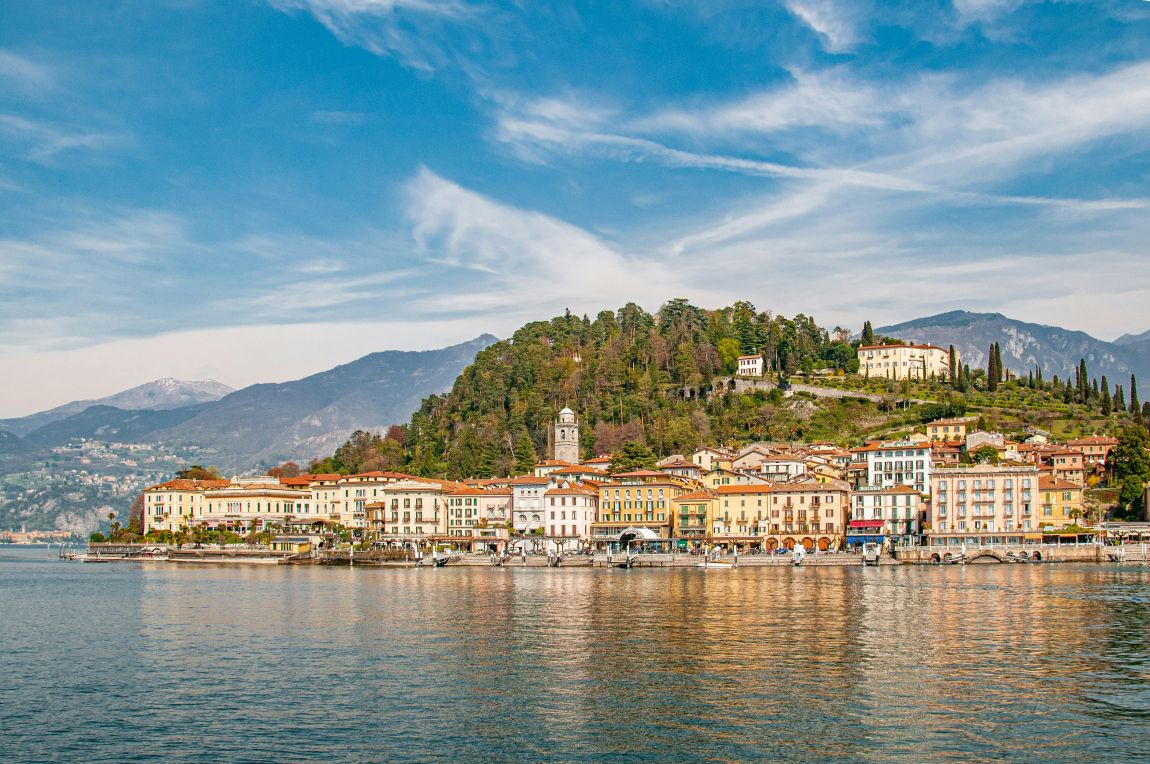
How Verona Shocked Football With a Serie A Title Win Worthy of Shakespeare
By Dan Cancian
The setting of two of William Shakespeare’s plays, Verona is no stranger to intrigue, love, drama and tragedy.
When it comes to gloriously unrestrained, all-consuming romance, however, nothing matches Verona’s fairytale run to the Serie A title in 1985.
A feat so improbable and built on so many fascinating characters, you could be forgiven for thinking it had been written by the Bard himself.
That Scudetto remains Verona’s only Serie A title and the only time a team from Veneto has been crowned champions in the Italian top flight.
Analysed through the prism of modern football, Leicester City’s incredible Premier League triumph in 2016 is the natural benchmark to understand the magnitude of such an accomplishment.
But it is also an imperfect comparison. While the Foxes had narrowly avoided relegation the previous season, Verona had finished the previous campaign in sixth place and were losing finalists in the Coppa Italia in 1983 and 1984.
“The Scudetto marked the culmination of a project that began with the appointment of Osvaldo Bagnoli in the summer of 1981,” Richard Hough, author of recently-published book Verona Campione, which celebrates the 40th anniversary of the Gialloblu’s Scudetto, tells Destination Calcio.
“Bagnoli earned immediate promotion as champions of Serie B in his first season with Hellas. The following season they finished fourth in Serie A, a remarkable feat for a newly promoted club and were beaten finalists in the Coppa Italia.
“In the 1983-84 season they finished sixth and were again beaten finalists in the Coppa Italia and reached the last 16 in the UEFA Cup.”
And yet their success was just as much of an anomaly four decades ago as it would be now.
After Torino’s exhilarating triumph in 1976, Juventus won five of the next eight Serie A titles, with AC Milan and Inter Milan securing one each and Roma ending a 41-year wait for a second Scudetto in 1983.
Power in Italian football remained concentrated in the usual offices.
Verona’s title was the first Scudetto won by a team not from one of Italy’s regional capitals since Pro Vercelli triumphed in 1922.
The Gialloblu, after all, had only narrowly avoided relegation to Serie C in 1981, surviving the second tier’s trap door by a single point before returning to Serie A in Bagnoli’s first season in charge.
Granted, Brian Clough had taken Nottingham Forest from the second division to English champions in the space of one season just six years earlier.
But that was in England. Italy was no place for those wishing to challenge the status quo, not least because this was Serie A at its absolute peak, boasting a collection of extraordinary talent.
With the world’s best footballers queuing up to move to the peninsula, Serie A’s limit of two foreign players per team meant imported talent was relatively equally distributed.
To put things into context, the new arrivals in the summer of 1984 included Karl-Heinz Rummenigge at Inter Milan, Brazil internationals Socrates and Junior to Fiorentina and Torino respectively.
AC Milan responded by signing Ray Wilkins and Mark Hateley, while Sampdoria welcomed Graeme Souness from reigning European champions Liverpool.
Such A-listers joined an already star-studded cast containing two of the greatest No10s in history in Michel Platini and Zico, plus 1982 World Cup hero Paolo Rossi, Brazil midfield generals Toninho Cerezo and Falcao, Denmark’s bright young hope Michael Laudrup and Poland maverick Zbigniew Boniek.
Verona welcomed two foreign players of their own, in the shape of German midfielder Hans-Peter Briegel and Danish striker Preben Larsen-Elkjaer.
A regular in the West Germany team that reached the 1982 World Cup final and the semi-finals of the European Championship two years later, Briegel’s versatility and physicality transformed Verona’s midfield.
Less was known of Elkjaer, who arrived from Belgian side Lokeren and went by his mother’s maiden name as he considered his father’s surname, Larsen, to be too common in his native Denmark.
Elsewhere, defender Fabio Marangon arrived from Alessandria, while central midfielder Dario Dona and winger Franco Turchetta joined from Bologna and Varese respectively to bolster Bagnoli’s squad.
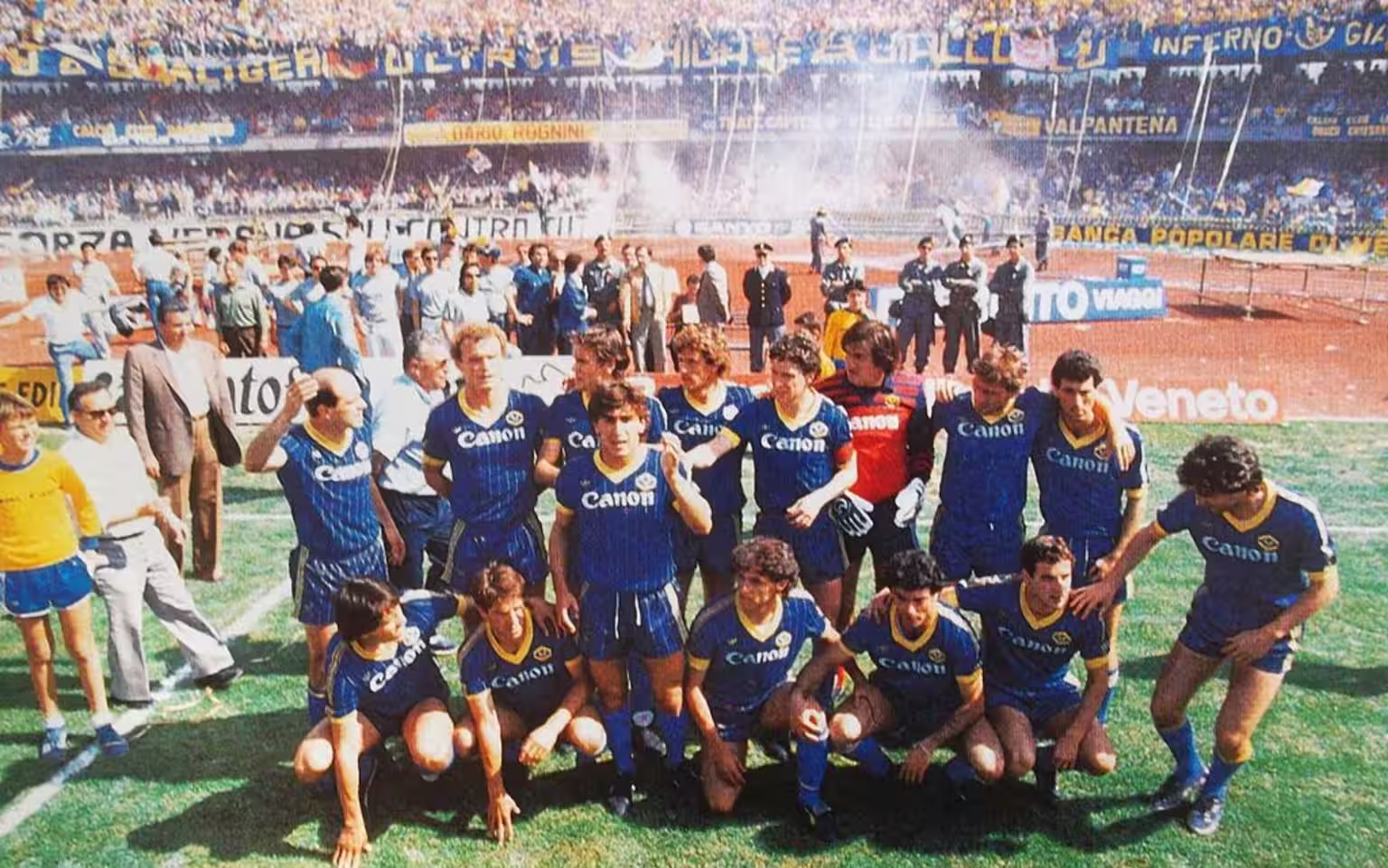
The Wizard of Bovisa
Having bounced around the lower leagues the Wizard of Bovisa – a nod to the working-class neighbourhood of Milan he was born in – arrived in Verona in 1981 with the Scaligeri in Serie B. Within three years he had led them into the UEFA Cup.
A tough-tackling midfielder in his playing days, Bagnoli’s teams mirrored his pragmatic approach and were built on a collection of hard-working, if unspectacular players.
Defenders Luciano Marangon and captain Roberto Tricella, an elegant libero, arrived from Roma and Inter respectively to protect goalkeeper Claudio Garella, whose unorthodox style proved oddly effective.
So much so, in fact, that Verona kept 16 clean sheets and conceded just 19 times in 30 matches.
Diminutive striker Giuseppe Galderisi and winger Pietro Fanna had joined from Juventus after failing to live up to their potential and would link up with Tricella in Italy’s 1986 World Cup squad.
They would be joined in Mexico by Antonio Di Gennaro, a talented midfielder whose high workrate matched his passing ability and made him the ideal orchestrator-in-chief of Bagnoli’s team.
But there was more to the unassuming Bagnoli and his men than a blue-collar approach.
They were perfectly drilled and tough to break down, but their colours were not firmly tied to the Catenaccio mast and they embraced counter-attacking football more than most of their contemporaries.
An astute man-manager, Bagnoli utilised just 17 players in Verona’s Scudetto-winning season, a staggeringly low number compared to the current standards.
“For Verona, Osvaldo Bagnoli is comparable to Bill Shankly at Liverpool: he made people happy,” Italian sports journalist Matteo Fontana, who wrote a book on Bagnoli, told The Guardian in 2016.
“He was, and is, a calm, honest person. And he was a great coach. And not only for Verona.
“But being so quiet and not at all attracted to the limelight, his contribution to football has not really been recognised by the press and commentators.”
Shrewd signings as they were, Elkjaer and Briegel commanded a fraction of the attention devoted to their fellow new Serie A import Diego Maradona, who had swapped Barcelona for Napoli for £7million.
The loose change behind the average Premier League club’s sofa now, but a world-record fee back then.
Unveiled in front of 75,000 delirious fans at the San Paolo in July, the Argentine made his Serie A debut away at the Bentegodi as Verona hosted Napoli on the opening day of the season.
It was a sobering experience for Maradona, who received a brusque introduction to Italy’s north-south divide.
The Verona ultras greeted Napoli players on the pitch with “Welcome to Italy” banners, a slight Maradona never forgot.
“We went up north and, wherever we went, they put up banners that said, ‘Wash yourselves’. It was disgusting. They were all racists,” the legendary Argentine would later reflect.
For their part, Verona did their talking on the pitch. Briegel opened the scoring halfway through the first half and nullified Maradona for most of the game.
Galderisi added a second shortly after and Di Gennaro sealed a 3-1 win late in the second half after Daniel Bertoni had marked his Napoli debut with a goal.
A stalemate at San Siro against Inter Milan a month later confirmed Verona as the surprise package before Juventus were put to the sword at the Bentegodi.
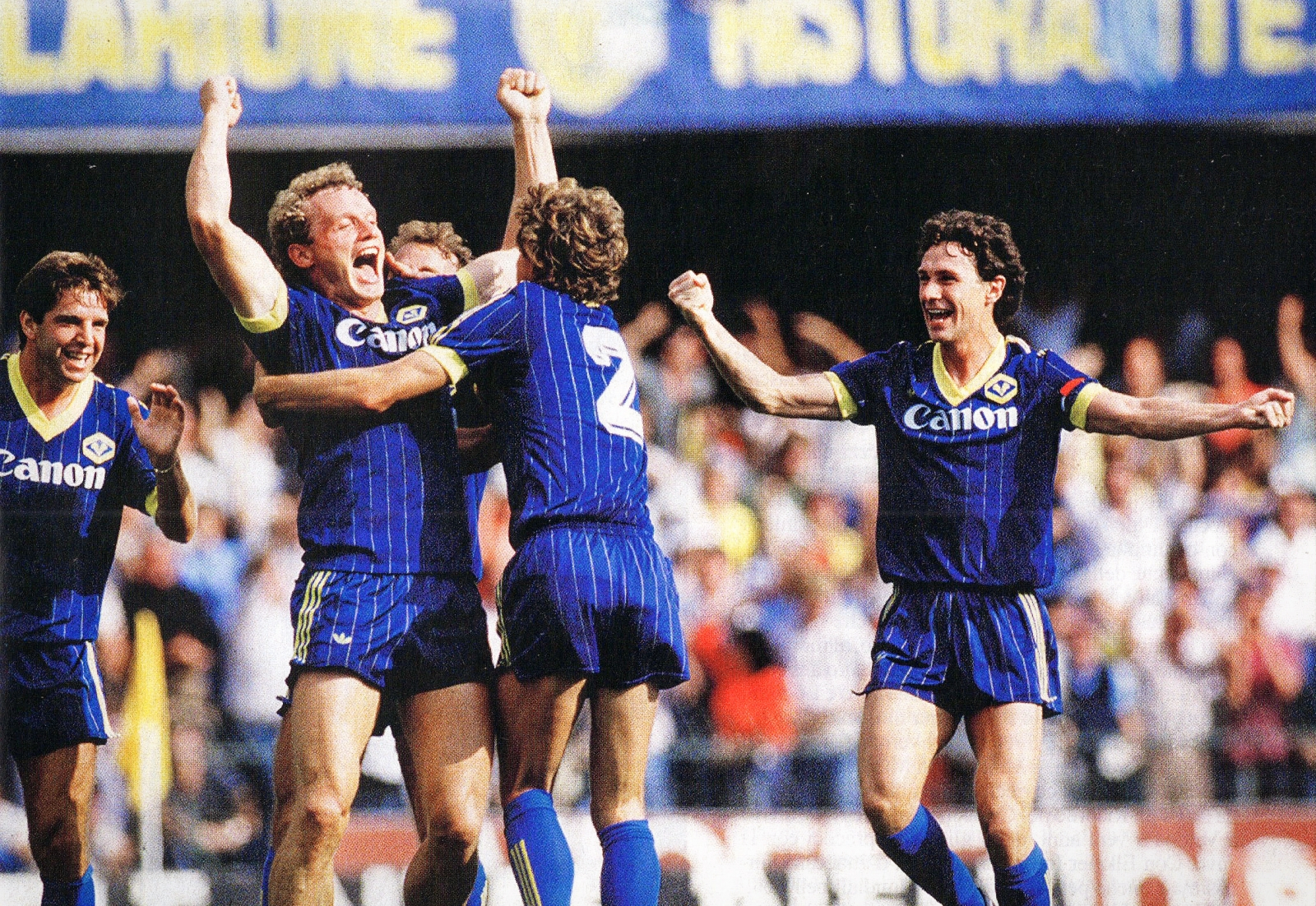
The former Bianconeri duo of Fanna and Galderisi combined for the opener in the second half, before Elkjaer scored arguably the most iconic goal of Verona’s campaign.
With less than 10 minutes left, the Dane pounced on a long ball bouncing just inside the Juventus half, allowing it to overtake him before motoring past Stefano Pioli, whose tackle only succeeded in removing one of the Verona striker’s boots.
Unfazed, Elkjaer kept his balance, cut inside the box and calmly slotted the ball past Stefano Tacconi.
“All I focused on was shooting and scoring, I didn’t think of anything else” the Dane explained on the 30th anniversary of his iconic finish.
“Even the following day, I didn’t think there was anything particularly unique about it [scoring without a boot]. But as time went by, I began realising the importance of it all.”
The immediate impact of Elkjaer’s goal was to keep Verona top of the table, a point ahead of Sampdoria and two ahead of AC Milan.
Mindful that drinking euphoria can lead to terrible hangovers, the ever-pragmatic Bagnoli insisted avoiding relegation remained his stated focus and deliberately refused to entertain any talk of Scudetto.
The winter of discontent
His warning proved prescient as winter’s arrival checked Verona’s momentum with just one win in four matches.
Almost inevitably, the last game of the Andata – the first half of the campaign – ended with the first defeat of the season, 2-1 against Avellino at the Partenio in a snow storm.
Crowned Campioni d’Inverno – Winter Champions – with a one-point margin over Inter, Verona’s title challenge nevertheless looked to be petering out as the Nerazzurri drew level on points a week later after Bagnoli’s men were held to a third scoreless draw in six matches by Napoli.
For only the second time since the opening weekend of the season, the Gialloblu were not alone at the top of the table. More worryingly, Inter had all the momentum.
Having resembled a golfer draining birdie putts in the final round of a major for the first 12 weeks of the season, Verona now looked to be suffering from a severe case of the yips.
A week later they squandered a 3-0 lead at Udine. A true Shakespearean drama. Fortunately for the Scaligeri, Briegel and Elkjaer had not read the script and scored in the second half to seal a crucial 5-3 win.
By now, the impact of the two summer signings could not be overstated.
“They were the cherries on the cake,” explains Hough. “They brought international quality, experience, pace and power, as well as goals.”
Briegel went on to receive the 1985 German Footballer of the Year award – the first foreign-based player to do so – after scoring nine goals in 27 Serie A appearances, the second-most prolific return after Galderisi (11).
The enigmatic, chain-smoking Elkjaer, meanwhile, scored eight times in 23 games and established himself as a hero in Verona, earning the nickname Il Sindaco – The Mayor – and finishing third and second in the Ballon d’Or rankings in 1984 and 1985 respectively.
Briegel was again on the scoresheet against Inter in mid-February, cancelling out Alessandro Altobelli’s opener as the title rivals shared the spoils at the Bentegodi.
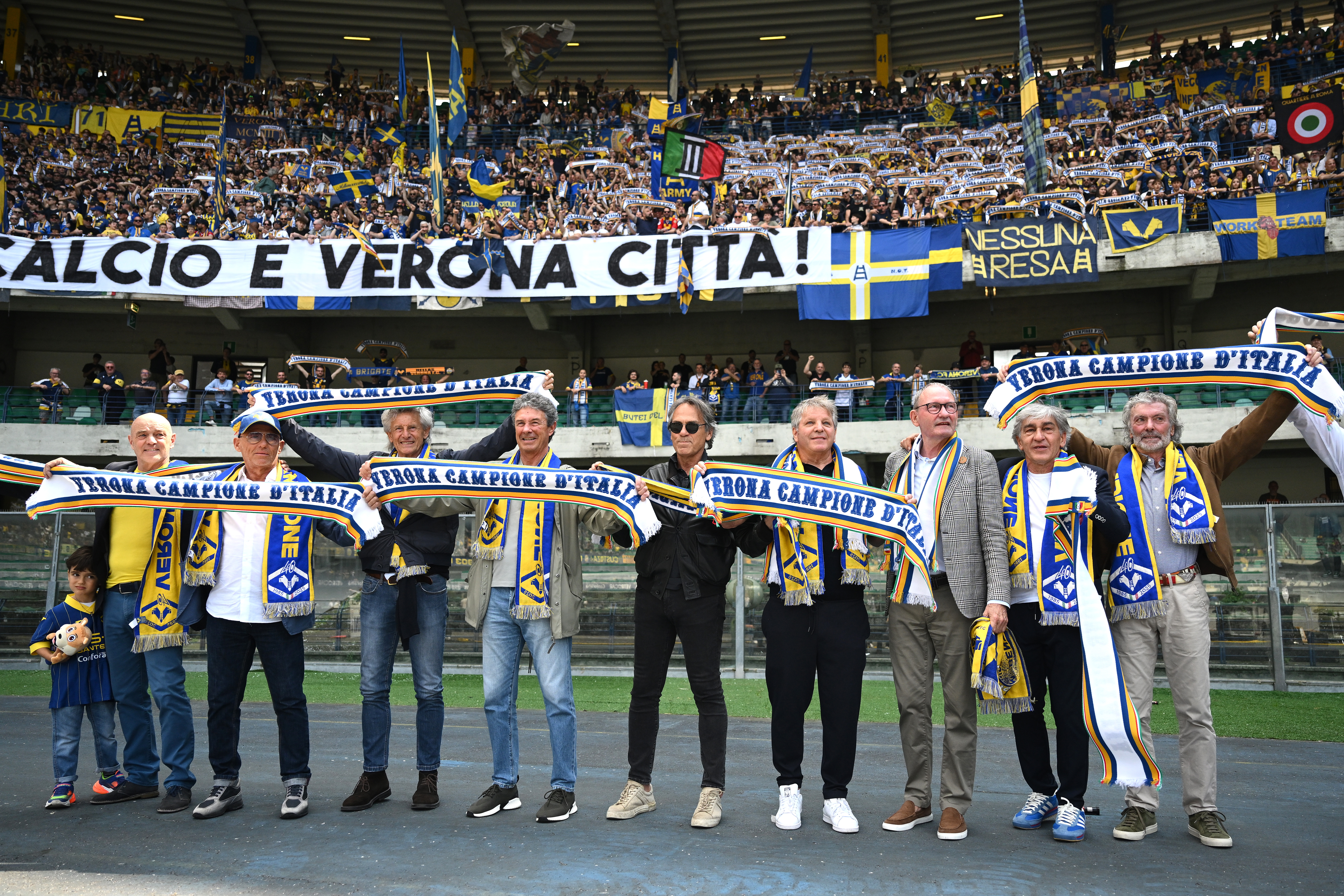
The following Sunday, Di Gennaro’s late equaliser rescued a point away against Juventus, a game Bagnoli would later describe as the moment his team realised the enormity of what was unfolding.
“I think the moment we realised we could win the Scudetto was the draw against Juventus in Turin,” he told RAI after Verona clinched the title in May. “It was a year-long adventure built on special moments such as that.”
With the shackles of Veneto’s rigid winter finally off, spring breathed a new lease of life into the Gialloblu, who picked up seven points from a possible eight in March.
The draw against Sampdoria at the end of the month left Verona six points clear of a quintet of challengers, which included the Blucerchiati themselves along with the two Milan clubs, Juventus and Torino.
Inspired by Junior’s brilliance and the goals of Aldo Serena and Walter Schachner, the Granata harboured dreams of their own.
In 1976 Luigi Radice had led Torino to their first Scudetto since the Superga air disaster that wiped out the Grande Torino team in 1949.
Now back under the Mole Antonelliana after a four-year absence, could Radice repeat the miracle and deny his former AC Milan team-mate Bagnoli the title?
The answer seemed to be a resounding ‘yes’ as Serena and Schachner scored in a 2-1 win at the Bentegodi, with Torino earning the distinction of being the only team to leave Verona with two points.
But the Granata’s rally had come too late. Draws against AC Milan and Como bookended a win over Lazio, leaving Bagnoli’s men a point away from glory.
On May 12, Verona witnessed an exodus seldom seen before or since as coaches and cars, all draped in blue and yellow, made their way to Bergamo for their meeting with destiny.
Elkjaer’s equaliser six minutes into the second half cancelled out Atalanta’s opener and wrote Verona’s name into Italian football folklore.
They had surprised a city, a country and even themselves if their appearance on RAI’s flagship sport show La Domenica Sportiva – Italy’s version of Match of the Day – a few hours after they clinched the title was anything to go by.
Watching the footage four decades on, two aspects of the show stand out. The fact that then-Juventus president Giampiero Boniperti dialled in to personally congratulate Bagnoli’s men, and how awkward the players looked in the spotlight.
This was not a team in the habit of winning trophies and it showed. Galderisi and his team-mates looked almost reluctant to join the celebrations, mindful of intruding on somebody else’s party.
And, in a sense, they had. Napoli and Sampdoria would win three of the next six Serie A titles, then Juventus and AC Milan restored the status quo by sharing 11 titles in 13 seasons.
“Football is a simple game,” Bagnoli would say later in his career when asked about his fairytale campaign with Verona. “The important thing is to be lucky enough to find the right people to then put them in the right places; leaving them free to express themselves.”
For nine magical months, he had the right people in the right places. Shakespeare could not have written it better.
Related Articles
Related Articles
We get a local take on what's hot in Cremona - where to eat and drink, sights to see and handy hints that might not be in the tourist guides.
The Artemio Franchi will always be the main reason calcio fans head to Florence but there is one other thing that must be on the to-do list.
After the final whistle is blown at Stadio Giuseppe Sinigaglia, there is no better place to unwind than Bellagio.


